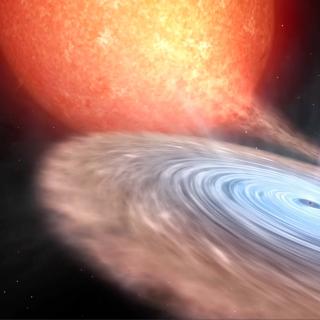Bibcode
Linares, M.
Referencia bibliográfica
The Astrophysical Journal, Volume 795, Issue 1, article id. 72, 10 pp. (2014).
Fecha de publicación:
11
2014
Revista
Número de citas
96
Número de citas referidas
87
Descripción
Compact binary millisecond pulsars with main-sequence donors, often
referred to as "redbacks," constitute the long-sought link between
low-mass X-ray binaries and millisecond radio pulsars and offer a unique
probe of the interaction between pulsar winds and accretion flows. We
present a systematic study of eight nearby redbacks, using more than 100
observations obtained with Swift's X-ray Telescope. We distinguish
between three main states: pulsar, disk, and outburst states. We find
X-ray mode switching in the disk state of PSR J1023+0038 and XSS
J12270-4859, similar to what was found in the other redback that showed
evidence for accretion: rapid, recurrent changes in X-ray luminosity
(0.5-10 keV, L X), between (6-9) × 1032
erg s–1 (disk-passive state) and (3-5) ×
1033 erg s–1 (disk-active state). This
strongly suggests that mode switching—which has not been
observed in quiescent low-mass X-ray binaries—is universal
among redback millisecond pulsars in the disk state. We briefly explore
the implications for accretion disk truncation and find that the
inferred magnetospheric radius in the disk state of PSR J1023+0038 and
XSS J12270-4859 lies outside the light cylinder. Finally, we note that
all three redbacks that have developed accretion disks have relatively
high L X in the pulsar state (>1032 erg
s–1).
Proyectos relacionados

Agujeros negros, estrellas de neutrones, enanas blancas y su entorno local
Los agujeros negros y estrellas de neutrones en binarias de rayos-X son laboratorios únicos para explorar la física de estos objetos compactos. No solo permiten confirmar la existencia de agujeros negros de origen estelar a través de mediciones dinámicas de sus masas, sino que también permiten investigar el comportamiento de la materia y la
Montserrat
Armas Padilla